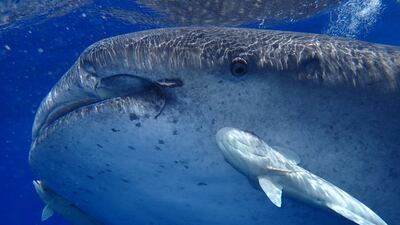A British research ship is set to begin a nearly 14,500-kilometre expedition to the South Atlantic Ocean on Thursday to survey previously unexplored depths and search for unknown species.
The Royal Research Ship (RRS) Discovery is set to sail from Southampton, Hampshire, for the six-week voyage to the remote British Overseas Territories of Ascension Island and St Helena.
The ship is undertaking the project as part of the UK government’s Blue Belt Programme — an international maritime conservation project.
Scientists on board the Discovery will use underwater cameras to explore hydrothermal vents on the 4,000-metre-deep seabed.
The team expects to encounter a range of marine wildlife including fish such as inflated rattails, viper fish and the common fangtooth, which were identified on previous trips. They also hope to find previously unknown species.
St Helena and Ascension have been chosen for the mission as they are home to two of the world’s largest Marine Protected Areas and host a variety of species, such as whale sharks, yellowfin tuna, humpback whales and green turtles.
The survey will gather data to enhance scientific understanding of the unique marine environment.
They will also take water samples to monitor quality and properties while assessing the number of species key to local fisheries to inform sustainable management quotas.
The team will also be monitoring human activities, such as illegal fishing in the protected waters.
“Globally only around 5 per cent of the oceans have been explored, at a time when it’s never been more important that they are protected,” said Paul Whomersley, scientific lead for Discovery 159, at the Centre for Environment, Fisheries and Aquaculture Science.
“This latest Discovery expedition provides a new opportunity to advance scientific understanding of some of the most remote and unexplored areas of ocean on our planet.
“Using the data collected and by growing our understanding of these biodiverse marine ecosystems, we can directly support Ascension and St Helena governments in their work to sustainably manage their vast Marine Protection Zones.”
The team of 50 scientists and crew members will spend 60 days at sea on board RRS Discovery — a 100-metre-long research vessel weighing 600 tonnes with facilities including a gym, mini cinema and cafeteria.
The ship contains dry and wet labs for scientists to store and analyse the samples collected, as well as state-of-the-art survey equipment such as deepwater cameras.
“This vital expedition is using cutting-edge technology to explore untouched areas of the ocean and will potentially uncover rare species and habitats, allowing us to protect and enhance our marine biodiversity for the future,” said International Marine Minister Scott Mann.
“It demonstrates how our scientists are amongst the top in their field, and marks a crucial step forward in our mission to protect 30 per cent of our international ocean by 2030, contributing to the global fight against climate change.”
Lord Goldsmith, Minister for Climate and Environment, said: “This is the latest example of British science leading the way in understanding and protecting our oceans for future generations.
“The knowledge the survey contributes will help us understand the abundance of rare species in need of our protection and I am incredibly excited to see what the scientists find.”


